Posts Tagged: RTA
rational task analysis (RTA)
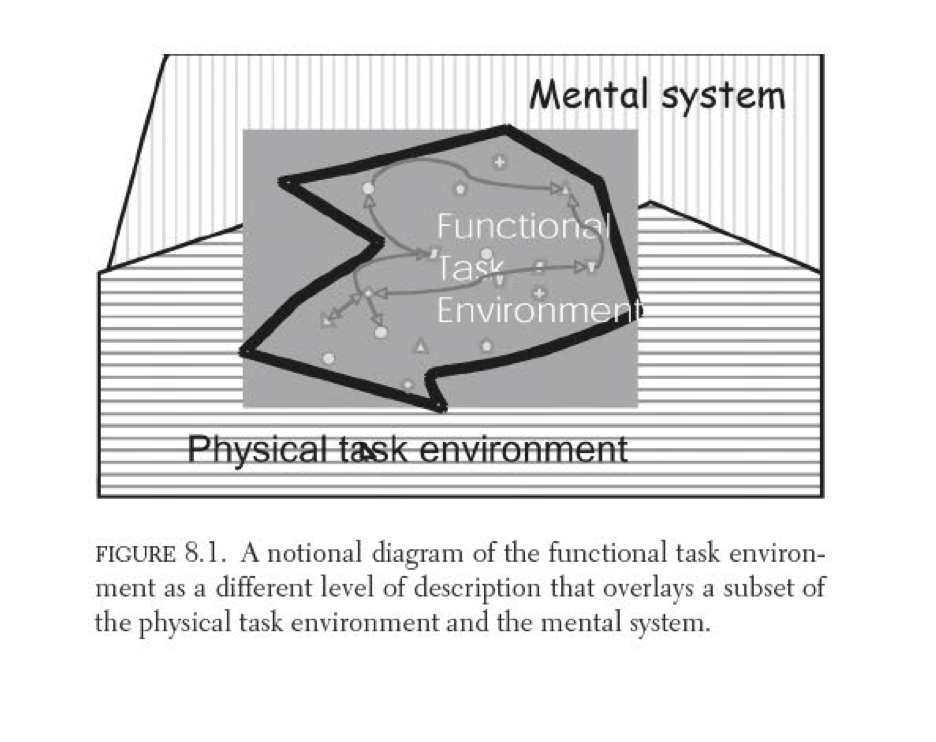
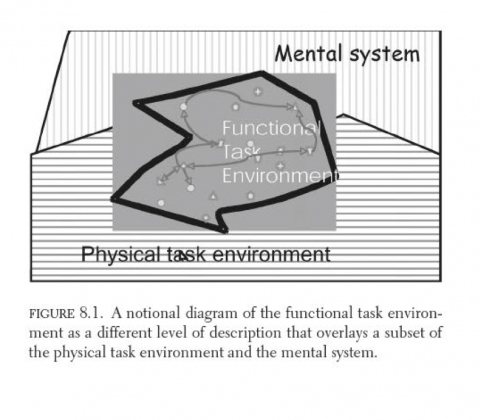
Chapter: The functional task environment
The apparent complexity of our behavior over time is largely a reflection
of the complexity of the environment in which we find ourselves.
(Simon, 1996, p. 53)
Wayne D. Gray, Hansjörg Neth, Michael J. Schoelles
The functional task environment
From the introduction: Although human thought may be possible in those floatation tanks that are used to encourage meditative states, in by far the majority of instances thought occurs in the context of some physical task environment. The physical environment can be as simple as a light and book. It can be as complex as the face of a mountain and the equipment of the climber. It may be as dynamic as the cockpit of an F-16 in supersonic flight and as reactive as a firefight in Iraq or as heated as an argument between lovers.
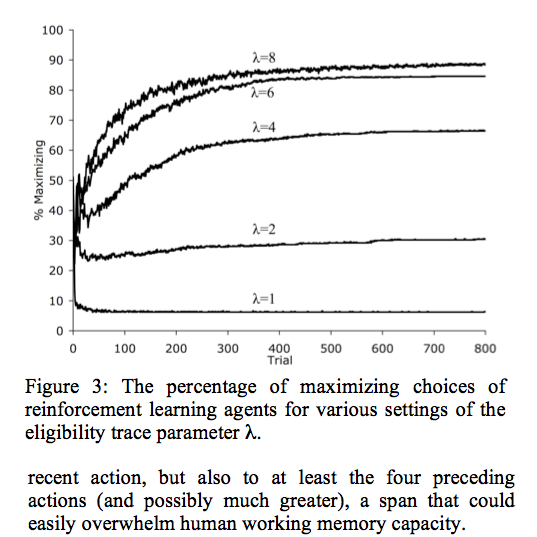
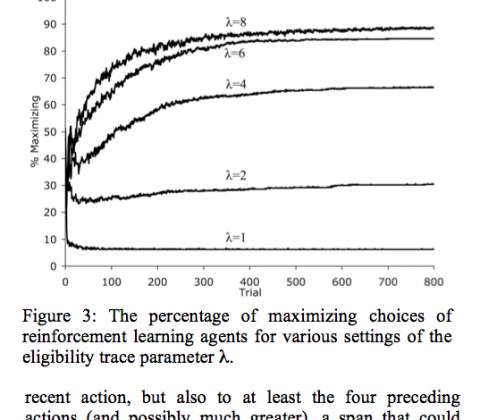
Paper: Melioration dominates maximization
| There is no reason to suppose that most human beings are engaged in maximizing anything unless it be unhappiness, and even this with incomplete success. |
| R.H. Coase (1980), The Firm, the Market, and the Law, p. 4 |
Hansjörg Neth, Chris R. Sims, Wayne D. Gray
Melioration dominates maximization: Stable suboptimal performance despite global feedback
Abstract: Situations that present individuals with a conflict between local and global gains often evoke a behavioral pattern known as melioration — a preference for immediate rewards over higher long-term gains. Using a variant of a binary forced- choice paradigm by Tunney & Shanks (2002), we explored the potential role of global feedback as a means to reduce this bias.
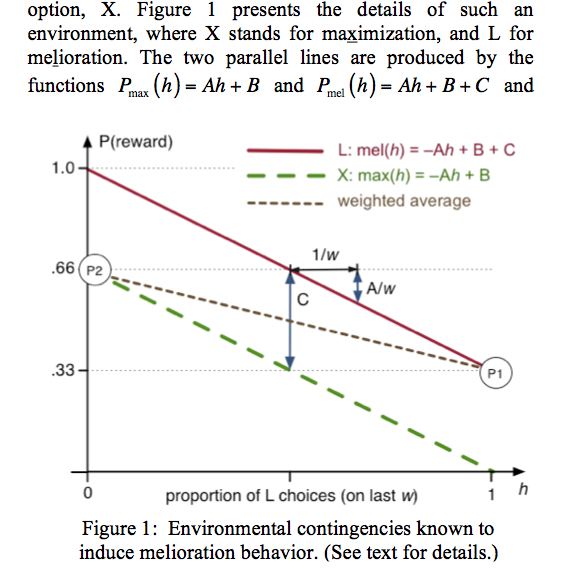
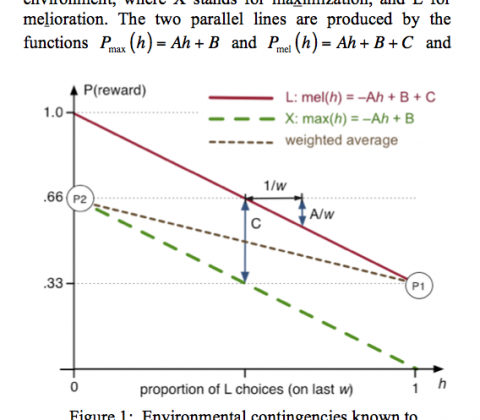
Paper: Melioration despite informative feedback
| In many ways the word ‘meliorizing’ expresses a sensible middle way between optimizing and satisficing. Where optimus means best, melior means better. (…) Like a river, natural selection blindly meliorizes its way down successive lines of immediately available least resistance. The animal that results is not the most perfect design conceivable, nor is it merely good enough to scrape by. It is the product of a historical sequence of changes, each one of which represented, at best, the better of the alternatives that happened to be around at the time. |
| Richard Dawkins (1982), The Extended Phenotype: The Long Reach of the Gene, p. 46 |
Hansjörg Neth, Chris R. Sims, Wayne D. Gray
Melioration despite more information: The role of feedback frequency in stable suboptimal performance
Abstract: Situations that present individuals with a conflict between local and global gains often result in a behavioral pattern known as melioration — a preference for immediate rewards over higher long-term gains. Using a variant of a paradigm by Tunney & Shanks (2002), we explored the potential role of feedback as a means to reduce this bias. We hypothesized that frequent and informative feedback about optimal performance might be the key to enable people to overcome the documented tendency to meliorate when choices are rewarded probabilistically. Much to our surprise, this intuition turned out to be mistaken. Instead of maximizing, 19 out of 22 participants demonstrated a clear bias towards melioration, regardless of feedback condition. From a human factors perspective, our results suggest that even frequent normative feedback may be insufficient to overcome inefficient choice allocation. We discuss implications for the theoretical notion of rationality and provide suggestions for future research that might promote melioration as an explanatory mechanism in applied contexts.
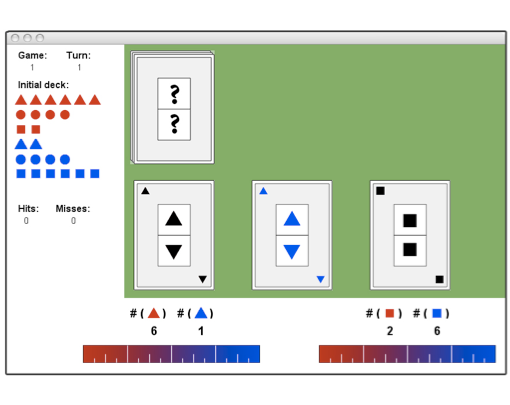
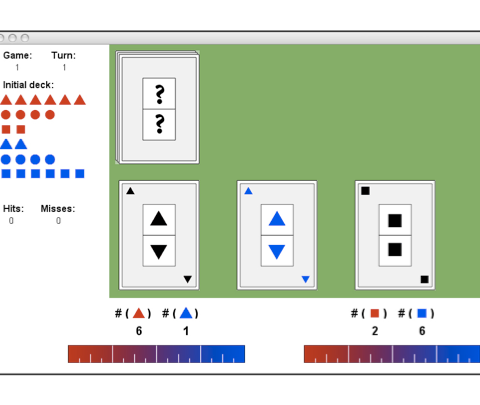
Paper: Dynamic memory updates in TRACS
| You can’t play 20 questions with nature and win. |
| Allen Newell (1973) |
Hansjörg Neth, Chris R. Sims, Vladislav D. Veksler, Wayne D. Gray
You can’t play straight TRACS and win: Memory updates in a dynamic task environment
Abstract: To investigate people’s ability to update memory in a dynamic task environment we use the experimental card game TRACS^tm (Burns, 2001). In many card games card counting is a component of optimal performance. However, for TRACS, Burns (2002a) reported that players exhibited a baseline bias: rather than basing their choices on the actual number of cards remaining in the deck, they chose cards based on the initial composition of the deck. Both a task analysis and computer simulation show that a perfectly executed memory update strategy has minimal value in the original game, suggesting that a baseline strategy is a rational adaptation to the demands of the original game. We then redesign the game to maximize the difference in performance between baseline and update strategies. An empirical study with the new game shows that players perform much better than could be achieved by a baseline strategy. Hence, we conclude that people will adopt a memory update strategy when the benefits outweigh the costs.